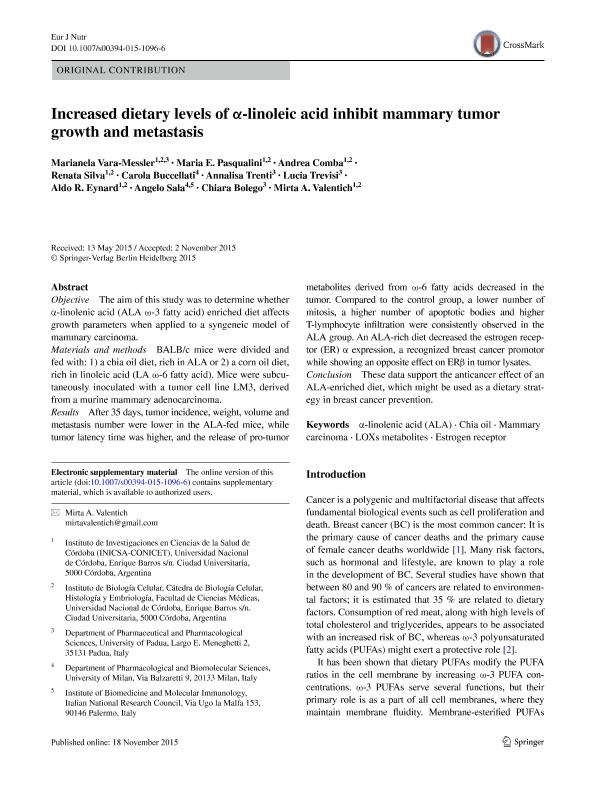Artículo
Increased dietary levels of α-linoleic acid inhibit mammary tumor growth and metastasis
Vara Messler, Marianela ; Pasqualini, María Eugenia; Comba, Andrea
; Pasqualini, María Eugenia; Comba, Andrea ; Silva, Renata Alejandra; Buccellati, Carola; Trenti, Annalisa; Trevisi, Lucia; Eynard, Aldo Renato
; Silva, Renata Alejandra; Buccellati, Carola; Trenti, Annalisa; Trevisi, Lucia; Eynard, Aldo Renato ; Sala, Angelo; Bolego, Chiara; Valentich, Mirta Ana
; Sala, Angelo; Bolego, Chiara; Valentich, Mirta Ana
 ; Pasqualini, María Eugenia; Comba, Andrea
; Pasqualini, María Eugenia; Comba, Andrea ; Silva, Renata Alejandra; Buccellati, Carola; Trenti, Annalisa; Trevisi, Lucia; Eynard, Aldo Renato
; Silva, Renata Alejandra; Buccellati, Carola; Trenti, Annalisa; Trevisi, Lucia; Eynard, Aldo Renato ; Sala, Angelo; Bolego, Chiara; Valentich, Mirta Ana
; Sala, Angelo; Bolego, Chiara; Valentich, Mirta Ana
Fecha de publicación:
03/2017
Editorial:
Dr Dietrich Steinkopff Verlag
Revista:
European Journal of Nutrition
ISSN:
1436-6207
e-ISSN:
1436-6215
Idioma:
Inglés
Tipo de recurso:
Artículo publicado
Clasificación temática:
Resumen
The aim of this study was to determine whether α-linolenic acid (ALA ω-3 fatty acid) enriched diet affects growth parameters when applied to a syngeneic model of mammary carcinoma. Materials and methods: BALB/c mice were divided and fed with: 1) a chia oil diet, rich in ALA or 2) a corn oil diet, rich in linoleic acid (LA ω-6 fatty acid). Mice were subcutaneously inoculated with a tumor cell line LM3, derived from a murine mammary adenocarcinoma. Results: After 35 days, tumor incidence, weight, volume and metastasis number were lower in the ALA-fed mice, while tumor latency time was higher, and the release of pro-tumor metabolites derived from ω-6 fatty acids decreased in the tumor. Compared to the control group, a lower number of mitosis, a higher number of apoptotic bodies and higher T-lymphocyte infiltration were consistently observed in the ALA group. An ALA-rich diet decreased the estrogen receptor (ER) α expression, a recognized breast cancer promotor while showing an opposite effect on ERβ in tumor lysates. Conclusion: These data support the anticancer effect of an ALA-enriched diet, which might be used as a dietary strategy in breast cancer prevention.
Archivos asociados
Licencia
Identificadores
Colecciones
Articulos(CIQUIBIC)
Articulos de CENTRO DE INVEST.EN QCA.BIOL.DE CORDOBA (P)
Articulos de CENTRO DE INVEST.EN QCA.BIOL.DE CORDOBA (P)
Citación
Vara Messler, Marianela; Pasqualini, María Eugenia; Comba, Andrea; Silva, Renata Alejandra; Buccellati, Carola; et al.; Increased dietary levels of α-linoleic acid inhibit mammary tumor growth and metastasis; Dr Dietrich Steinkopff Verlag; European Journal of Nutrition; 56; 2; 3-2017; 509-519
Compartir
Altmétricas



